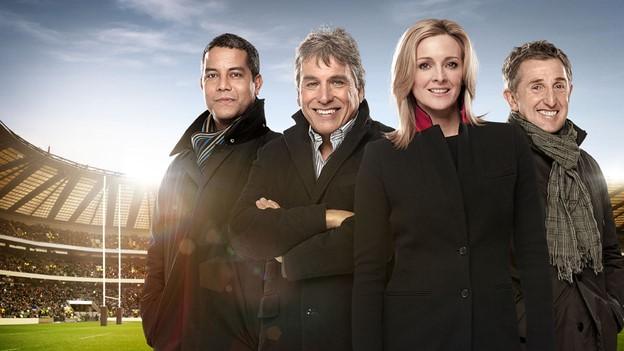Six Nations 2017: Fraser Brown - Rugby pulled me out of depression
- Published
Fraser Brown talks about battling back from depression
2017 RBS Six Nations: England v Scotland |
|---|
Venue: Twickenham Date: Saturday, 11 March Kick-off: 16:00 GMT |
Coverage: Watch live on BBC One & BBC Sport website & app. Listen on BBC Radio Scotland & BBC Radio 5 live sports extra; text commentary on BBC Sport website & app |
We could see Fraser Brown's happiness on Saturday, down there on the field when the last whistle went, embracing his team-mates, saluting the fans, drinking in the atmosphere on a special day.
Later, in interviews, he touched on his broader story, but there is more to that than he cared to share at the time. We knew the outline; how, as a younger player with Edinburgh, he was dogged by injury, how he sustained dislocated shoulders and a bulging disc in his neck, how he missed two years of rugby, how Edinburgh let him go.
That was 2011 and he was nowhere. His dream of professional rugby looked dead. He retreated to his parents' farm near Biggar and played stress-free club rugby with Heriot's when his body would allow.
It started off as social stuff, then the bug bit again. From Goldenacre to Scotland Sevens to Glasgow to the Scotland bench to the Scotland Test team; and then to the media room at Murrayfield talking about how it felt to be two wins from three in the Six Nations with a trip to Twickenham to come.
We knew of a struggle, but not about the struggle. We knew it had been tricky for him to get to where he is now - a ball-carrying and skilful hooker, an intelligent leader, a robust character playing terrific rugby - but we didn't know how tricky.
Coping with injuries
"I had quite a few injuries when I was younger," said Glasgow Warriors and Scotland player Brown, who at 27 is in the form of his life. "I had major ones - shoulder ones and neck surgery. It's difficult when you're a young guy to overcome not the physical aspect, because your body will catch up with you and you'll grow and develop, but the mental aspect.
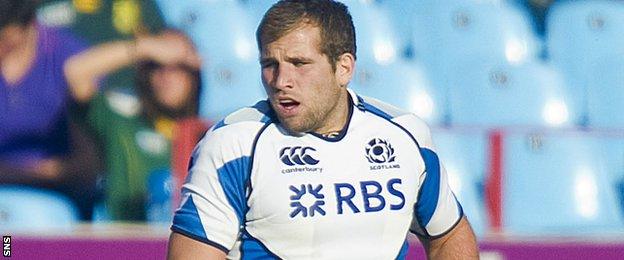
Brown made his Scotland debut against Italy in 2013
"When I left Edinburgh I hadn't played for two years and you're going in every day to the club and you're seeing other guys training and playing. You're doing rehab, you make a comeback, you get a game and then you're injured again.
"There's been a lot in the press recently about mental health and depression and it's a very real thing. It was hard. It was really hard.
"You feel so isolated. There's no rhyme or reason to why you feel that way. I had family, a partner, great friends around me. There's no reason why you get to that point, but you do feel depressed and alone. It happened and it's something I battled with and I still battle with it a little bit now. You never really get over it. It's something you have to come through gradually and it's taken me five or six years.
"I might still have bad times, I might still have really low points, a low couple of weeks or a low month or two. But it's about having the support around me and having the resolve to know that I can speak about it now and let it out and seek help.
"Rugby kick-started it in the first place, but rugby helped pull me out of it as well. It was all because I wasn't able to do something I really enjoyed doing."
Mental health now 'constantly in the public eye'
As Brown says, mental health pays no respect to age or fitness, it doesn't matter if you're a super-charged sportsman or woman with the world at your feet, it can get you just as easily as it can get somebody else. It's estimated that one in four people in the UK have, or have had, a mental health issue of some kind.
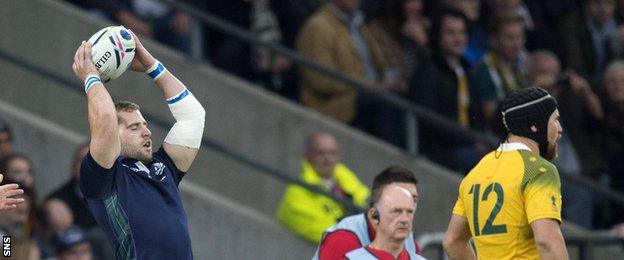
Brown's line-out throw resulted in Scotland conceding the match-winning penalty to Australia in the World Cup quarter-final in 2015
Lately, as part of a campaign called Lift The Weight, some rugby players in England have spoken about their own experiences. Among them are James Haskell, a current England flanker, Jonny Wilkinson, the England icon, Duncan Bell, a former England Test player, Ollie Phillips, former England Sevens player, Netani Talei, fromerly of Edinburgh and Nolli Waterman, who won the World Cup with the England women's team in 2014.
"It's a hard thing to describe to people who haven't been through it," Brown continues.
"The worst of it was 2010-2012. It was a really difficult time in my life. It's not something a lot of people feel comfortable talking about so it's great to have all that awareness around it now.
"It's constantly in the public eye. There's more support. There's quite a few of my friends from school who have gone through similar things and when we found that out we spoke about it to each other and we helped each other through it."
Returning to Twickenham
There was no one moment when Brown woke up and felt better. Going to play rugby with Heriot's helped. Getting a run of fitness helped. Getting snapped up by Glasgow helped. Baby steps all the way. And now he's here - enjoying his family life, enjoying his rugby, looking forward to what lies ahead, which is Twickenham.
His last visit? He's not likely to forget it. World Cup quarter-final against Australia. Rain falling, crowd roaring, Scotland leading. A few minutes from one of the great victories and a place in the semi-final. Just a line-out to negotiate and they're practically there. Brown with the throw. You know the rest.
"It's still surreal to me. It would have been so easy to let that disappointment linger and allow it to control what I did in the next couple of months, but I tried to take the positives out of the situation and help it transform the way I play the game.
"It wasn't a good experience, but a lot of players go through something like that. The hope is that you don't do it in the last minute of a World Cup quarter-final, but you can't control when those set-backs happen.
"We were all young in our progression and it allowed us to look harder at ourselves. We're in a place now where whatever obstacle that's put in front of us we're going to have a go.
"We want to express ourselves on the pitch. With the players we have there's no point playing rugby that's against everyone's natural instincts. We have some incredibly talented players. Our backs can be lethal and our forwards have a bit more of a hard edge. We're enjoying what we're doing."
Scotland have developed a ruthlessness in attack that's joyful. They may not have created as many try-scoring chances as some of the others, but their conversion rate has been outrageously high. Their appreciation of space and their skill in exploiting space has been world class at times.
Brown talks about obstacles in their way. Injuries, mostly. They beat Wales in the Six Nations without six players who would have been in the 23 had they been available.
They've also got to this point while enduring all sorts of hardship in the scrum. Brown, literally, has had a front-row seat in all of that. He says that an inexperienced front-row has had to learn on the job in the most intense environment you can imagine.
England, who host Scotland on 11 March, haven't really fired a shot in the championship and yet they're three wins from three. "Ominous," is the word he uses. "They haven't put in a really good performance but they've won everything. It's going to be a huge challenge," Brown added.
"Eddie Jones has already started the mind games, saying the pressure is on us. The weight of a nation and all of that. I'm not sure. We haven't won down there in 34 years. Not sure there's much weight from the nation. It's all good fun, though. All part of the theatre."
He's had his own personal drama to contend with and, in that, he's the embodiment of a powerful message - one that in essence, is the message of the entire Scotland team. Never give up. Always believe.
- Published2 March 2017
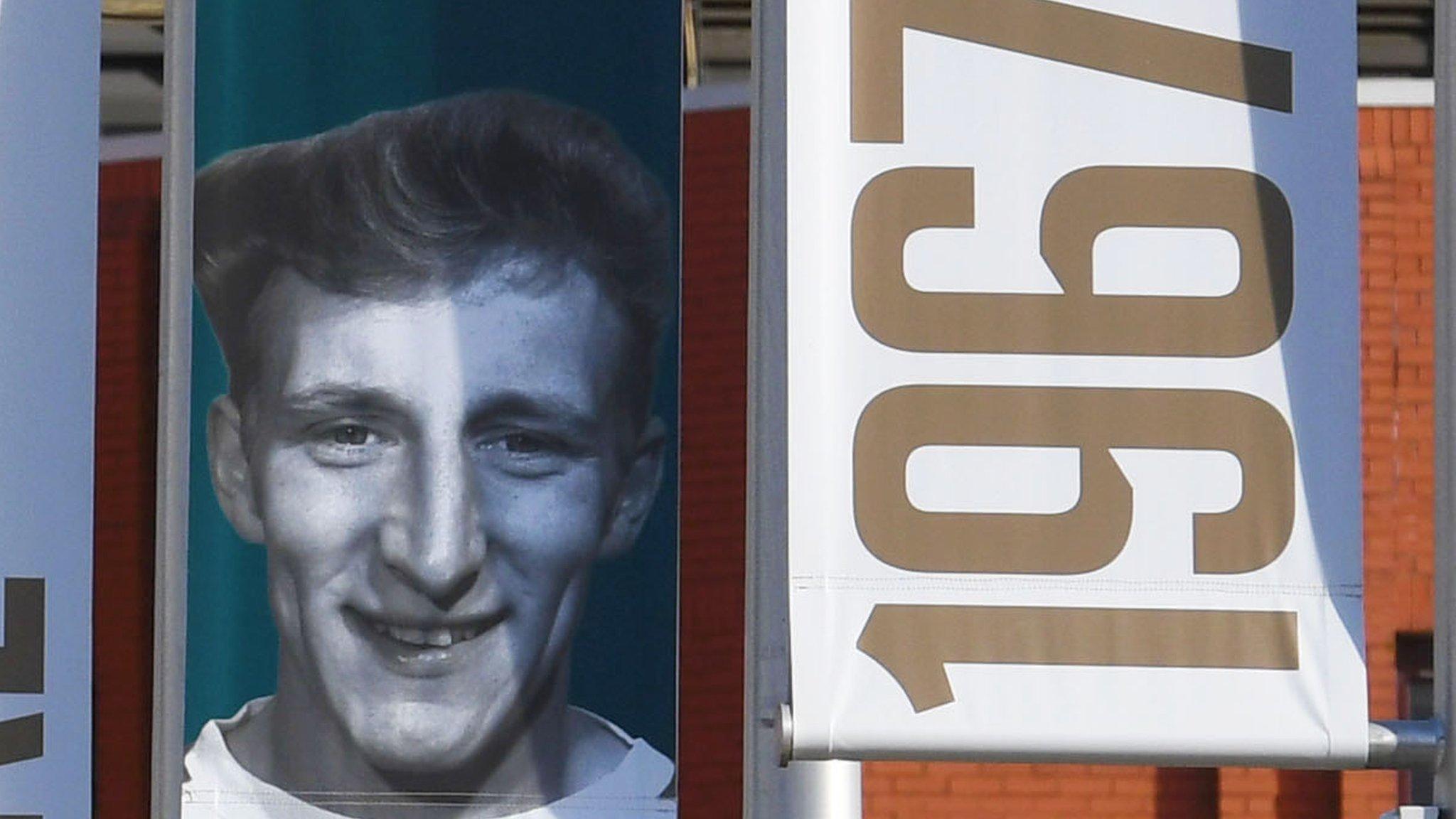
- Published3 March 2017

- Published3 March 2017
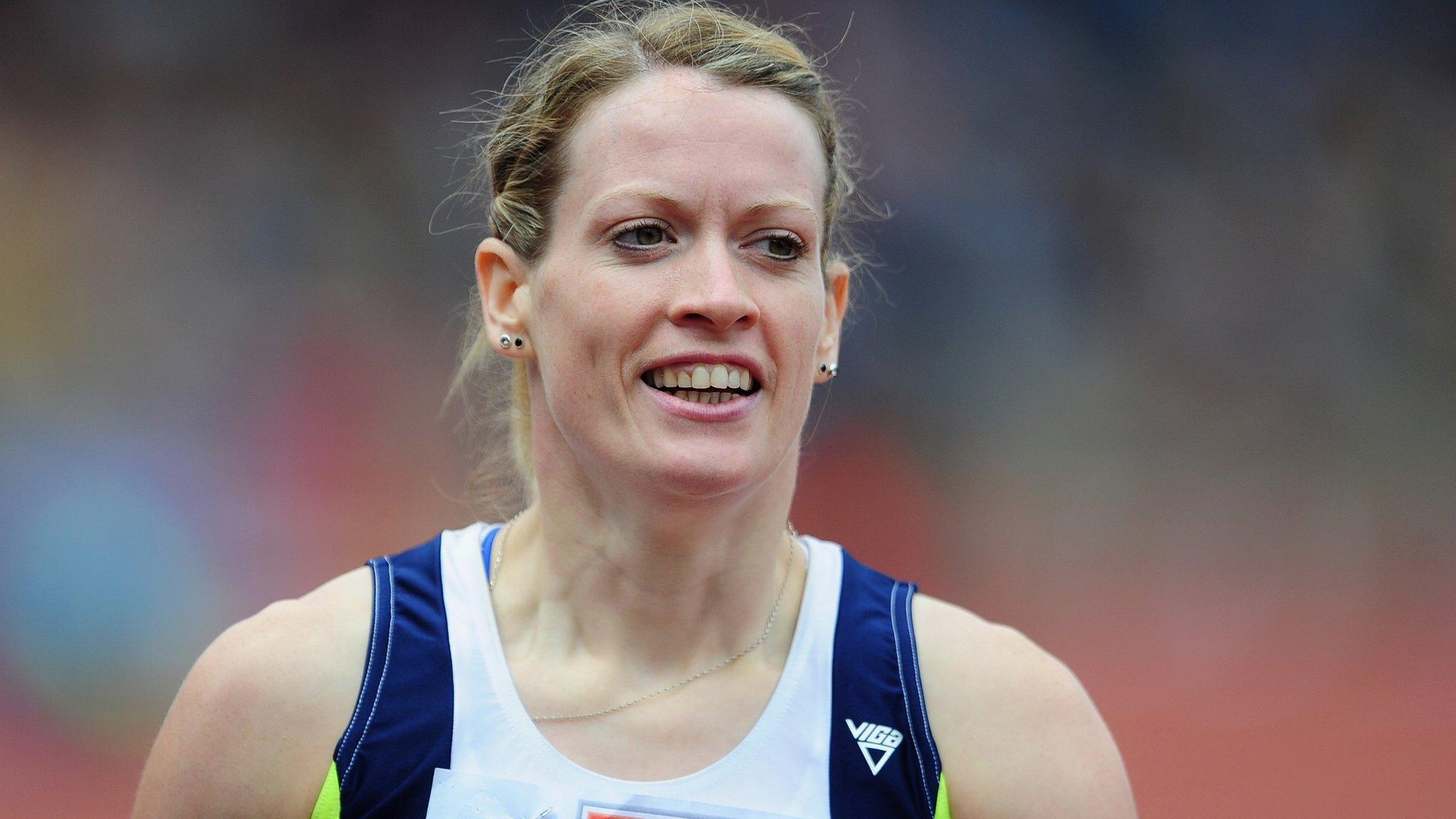
- Published17 March 2017
